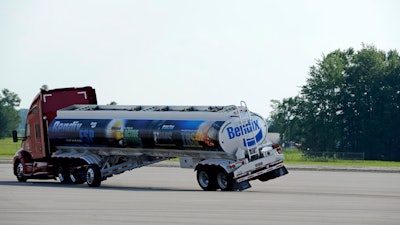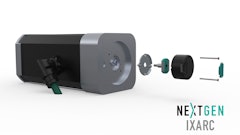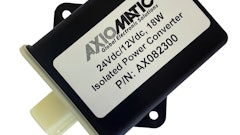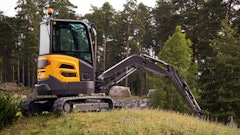
A dozen years and countless road-proven miles after electronic stability control (ESC) was first made widely available to the North American commercial vehicle market, the technology known as full-stability will be required on most new Class 7 and 8 air-braked tractors in the United States as of August 1. Yet, even as the National Highway Traffic Safety Administration’s (NHTSA) mandate is set to take effect, there is discussion of its elimination – a move Bendix Commercial Vehicle Systems LLC believes would impede the pursuit of safer highways across the country.
“Because the current administration has required elimination of two federal rules for every one added, NHTSA has said the full-stability mandate could be on the chopping block,” says Fred Andersky, Bendix Director of Government and Industry Affairs. “While Bendix has always preferred to let the commercial vehicle market decide, this is a case in which a mandated technology will undoubtedly help reduce the incidence of both rollover and loss-of-control crashes. In fact, the market has already recognized this, with all of the major North American heavy-duty truck manufacturers offering electronic stability control as standard on most models.”
Full-stability technology helps to mitigate both rollover and loss-of-control crashes on dry, wet, snow-, and ice-covered surfaces. An ESC system includes more sensors and braking capability than roll-only stability (RSC – Roll Stability Control), which means it uses more information to enable more robust interventions when needed. Bendix became the first North American brake manufacturer to make full-stability solutions widely available for the commercial vehicle market when it launched the Bendix ESP Electronic Stability Program in 2005, and the system has been equipped on more than 500,000 vehicles.
Federal Motor Vehicle Safety Standard 136 requires full-stability systems on new Class 7 and Class 8 truck tractors and motorcoaches with a gross vehicle weight rating of greater than 26,000 lbs. The first of the regulation’s three phases impacts Class 7 and 8 6x4 tractors – a majority of today’s tractors. Phase two mandates ESC on Class 8 buses beginning June 24, 2018, and phase three encompasses most remaining Class 7 and 8 highway tractor and motorcoach applications on August 1, 2019.
“Roadmap to the Future” White Paper Update
Recognizing the importance of ongoing industry dialogue to highway safety, Bendix will shortly publish “Full Stability and the Roadmap to the Future – Are We Still on the Right Road?,” an update to its 2008 white paper on making the case for full stability. The updated publication, available for download at knowledge-dock.com, includes more recent crash and rollover data, information on measuring the effectiveness of ESC, and a discussion of whether rolling back FMVSS 136 is a good idea.
“In its recent budget estimates for fiscal year 2018, NHTSA included the full-stability mandate among the regulations it feels can be dropped – although the agency didn’t provide any insight regarding why this would make sense,” Andersky says. “We feel there are a number of reasons to oppose this move, not the least of which is that this is a regulation that helps solve a deadly problem still very much in evidence on our roadways.”
Bendix, the North American leader in the development and manufacture of leading-edge active safety and braking system technologies for commercial vehicles, also notes that with implementation already under way as vehicle manufacturers have made ESC standard, expected cost points are low. Additionally, the technology provides the basis for more advanced safety systems, such as collision mitigation, and is expected to form the foundation for even further safety advancements in the future, including automated and autonomous applications.
“The addition of full-stability technology – or any other driver assistance system – is not intended to encourage or enable aggressive driving,” Andersky says. “ESC still requires a driver to be alert and practice safe driving habits, and fleets must still maintain comprehensive and proactive driver training programs: Ultimate responsibility remains in the hands of the driver at all times.”
Through its industry leadership, post-sales support, and ever-growing portfolio of technologies, Bendix delivers on safety, as well as vehicle performance and efficiency, encouraging investment in equipment and technologies that help fleets and drivers lower their total costs of vehicle ownership while improving safety for all who share the roads.



















